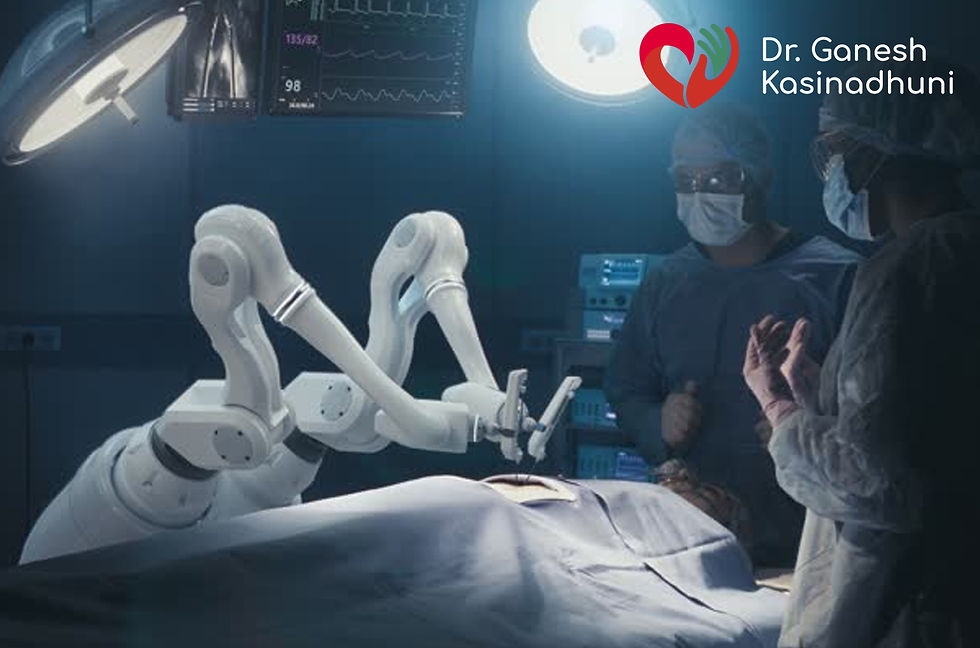Use of Artificial Intelligence in Improving Outcomes of Heart Failure Treatment
- Shiftwave Technologies
- Sep 16, 2025
- 4 min read

Heart disease is still one of the major causes of death globally, claiming millions of lives annually. In India, it is especially prevalent, with increasing numbers of heart attacks and heart failure, even among younger people. Thankfully, Modern cardiology is experiencing a revolution. From Artificial Intelligence (AI) diagnosis to precision medicine and less invasive treatments like Transcatheter Aortic Valve Replacement (TAVR), patients today have safer and more effective care than ever.
AI in Cardiac Diagnosis and Treatment
One of the most thrilling recent advances in heart care is the increasing use of Artificial Intelligence. It used to take manual interpretation of ECGs, echocardiograms, and stress tests to diagnose heart disease, a time- and error-prone process. AI now lends speed and precision to this process.
Early Detection of Heart Disease: AI algorithms can scan medical scans, ECGs, and CT scans to identify minor abnormalities that may otherwise be missed. This enables physicians to detect the risk of heart attack or heart failure earlier.
Predictive Analytics: AI tools can scan patient history, habits, and lab tests to predict future risks. AI-driven software, for instance, can warn physicians if a patient is likely to develop heart failure in the future.
Wearable Devices: Heart monitors and smartwatches nowadays use AI to monitor heartbeat, blood pressure, and oxygen in real-time. They can even detect an abnormal pulse and send immediate warnings to doctors.
AI-Assisted Surgeries: In advanced cardiac centers, AI is used to guide robotic surgeries, ensuring precision and lowering complications.

Precision Medicine: Personalized Care for Every Heart
Each patient has their own uniqueness, and so does their heart health. Precision medicine fits in here. Rather than providing the same treatment to all patients, physicians now create therapies based on a patient's genetics, lifestyle, and environment.
Tailored Medications: In traditional treatment, two patients with identical symptoms can be given the same medications. However, with precision medicine, physicians can order medications that exactly suit a patient's genetic makeup, reducing side effects and enhancing efficacy.
Managing Chronic Conditions: Diabetic, high blood pressure, or cholesterol patients usually experience complications of heart attacks or heart failure. Precision medicine ensures personalized diet plans, exercise regimens, and medication, cutting risks considerably.
Genetic Testing: Genetic screening at an advanced level can detect inherited cardiac disorders. Sudden heart failure or heart attack histories within families can be aided by preventive care in the early stages.
Better Outcomes: Precision medicine prevents treatments from being merely reactive, but proactive—preventing patients from developing heart disease instead of just treating them once symptoms start showing.
Minimally Invasive Cardiac Procedures: Spotlight on TAVR
Few years ago, most heart conditions were treated by open-heart surgery. These were done with big incisions, long hospitalizations, and long periods of recovery. But with improvements in minimally invasive cardiac care, all that is changing.
One of these revolutionary procedures is Transcatheter Aortic Valve Replacement (TAVR)
One groundbreaking procedure is Transcatheter Aortic Valve Replacement (TAVR).
What is TAVR?
TAVR is a minimally invasive procedure to put in a new stenosed aortic valve that does not open appropriately (aortic stenosis). Rather than open-heart surgery, physicians place a new valve via a catheter inserted through the leg artery, making the surgery safer, particularly for older and high-risk patients.
Advantages of TAVR:
Less pain and scarring
Shorter hospital stay
Faster recovery
Lower risk of complications compared to open surgery
Who Needs TAVR?
Severe aortic stenosis, particularly patients who cannot have conventional surgery because of age or other illnesses, are the best candidates.
In addition to TAVR, other minimally invasive procedures such as stent placement with angioplasty, catheter ablation of arrhythmias, and robot-assisted bypass surgeries are also making patients live healthier lives.
For patients concerned about long recovery times or surgery risks, Dr. Ganesh,the best cardiologist in Vizag can now provide cutting-edge procedures like TAVR, without the trauma of open-heart surgery.

Combining AI, Precision Medicine, and Minimally Invasive Techniques
What makes these advancements truly powerful is how they work together. Imagine a scenario where:
Artificial intelligence identifies patients at risk for heart failure early.
Precision medicine makes the precise drugs and lifestyle changes necessary.
Minimally invasive surgeries such as TAVR address advanced diseases with little downtime.
This integrated approach means better outcomes, longer life expectancy, and improved quality of life for patients.
Why This Matters for Patients in Vizag
Vizag is becoming a center of excellence for advanced Heart care in Andhra Pradesh. It is no longer necessary for patients to go to metro cities to seek advanced heart disease treatments.
For patients with risk factors such as diabetes, hypertension, or a family history of heart disease, this means:
Early detection of heart attacks and heart failure risks.
Access to preventive care and tailored treatments.
Safer, faster, and more effective surgical options if required.

Conclusion
The future of cardiology is here, fueled by Artificial Intelligence, precision medicine, and less invasive strategies like TAVR. These technologies are refining heart care to be more precise, personalized, and patient-focused.
If you or your loved one is worried about heart attacks, heart failure, or other heart conditions, it's critical to get treated by the Best cardiologist in Vizag. Having access to the latest technology and contemporary treatments, you can be sure of international-level care within your city.




Comments